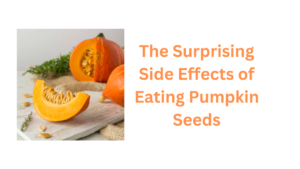The Surprising Side Effects of Eating Pumpkin Seeds
Pumpkin seeds are a powerhouse of nutrition, and they’re delicious, too! But you may not be aware of all the amazing benefits they offer—or the surprising side effects of eating too many of them.
In this article, we’ll give you the lowdown on everything pumpkin seeds. From their nutritional value to their potential side effects, we’ve got you covered. So sit back and enjoy this interesting read about one of autumn’s most beloved foods!
What Are the Health Benefits of Pumpkin Seeds?
Pumpkin seeds are a great source of vitamins, minerals and antioxidants.
They’re also a good source of omega-3 fatty acids, which are beneficial for your heart, brain and skin health. Some of the other key nutrients in pumpkin seeds include zinc, vitamin E and magnesium.
Potential Side Effects of Consuming Pumpkin Seeds
Before you go ahead and start munching on pumpkin seeds, it’s important to know about the potential side effects. After all, you wouldn’t want to experience any unpleasant surprises.
Here are some of the potential side effects of consuming pumpkin seeds:
1) Digestive issues: Pumpkin seeds can be hard to digest for some people, leading to gas, bloating, constipation and diarrhea.
2) Nut allergy: If you’re allergic to nuts, you may also be allergic to pumpkin seeds.
3) Migraines: Some people report that eating pumpkin seeds can trigger migraines.
4) Joint pain: Pumpkin seeds contain high levels of zinc, which can sometimes cause joint pain.
Risks Associated With Consuming Too Much Pumpkin Seeds
So, are pumpkin seeds good for you? The answer is yes—and no.
Yes, pumpkin seeds are a good source of nutrients like magnesium, manganese, and zinc. But they also contain a high level of zinc, which can be harmful in large doses. Consuming too many pumpkin seeds can lead to side effects like nausea, vomiting, and diarrhea.
 |
| The Surprising Side Effects of Eating Pumpkin Seeds |
It’s also important to note that pumpkin seeds can interact with certain medications, like blood thinners and steroids. So if you’re taking any medication, be sure to speak with your doctor before incorporating pumpkin seeds into your diet.
How to Ensure You’re Getting the Most Out of Eating Pumpkin Seeds
It’s no secret that eating pumpkin seeds can be incredibly healthy — they’re rich in essential vitamins and minerals, as well as omega fatty acids. But if you want to get the most out of it, there are a few things you should keep in mind.
First, make sure you buy organic, raw pumpkin seeds if possible. These will contain the most nutritional value and flavor than processed or cooked ones.
Second, give your body enough time to absorb the nutrition from the pumpkin seeds. I recommend eating them slowly throughout the day rather than downing a bunch of them all at once — this way your body can process their nutrients more effectively.
Lastly, consider buying roasted pumpkin seeds instead of raw ones if you find that the taste is more appealing to you — just don’t go overboard with it since they may contain added sugars or preservatives.
The Best Ways to Incorporate Pumpkins Seeds Into Your Diet
Want to make sure you’re getting the most out of pumpkin seeds? Here are some of the best ways to incorporate them into your diet:
-
Sprinkle them on top of salads, soups, oats, or stir-fries for some added crunch.
-
Use them in protein bars or energy bites.
-
Add them to baked goods like breads, muffins, and cookies.
-
Use them as a topping for yogurt and smoothie bowls.
-
Toast them and use as a seasoning for sauces, pestos and dips.
-
Or simply eat them as a snack – just make sure you’re mindful of portion sizes!
As you can see there are several ways you can enjoy the health benefits of pumpkin seeds without sacrificing flavor! Enjoy incorporating them into your diet!
Alternatives to Reap the Benefits of Pumpkin Seeds
If you’re not a big fan of pumpkin seeds, then there are other ways to reap the benefits. Here are some alternatives:
-
Try adding other types of seeds to your diet, such as sunflower and flaxseed. Each type has its own unique health benefits and provides a unique crunch and nutty flavor.
-
Snack on roasted pumpkin seeds instead. Roasting the seeds can help bring out some subtle flavors that you might not have noticed before and make them more enjoyable to eat.
-
Use shelled pumpkin seeds in your cooking. You can add them to soups, salads, breads and more for an added crunch and earthy flavor.
-
Make your own pumpkin seed butter! All it takes is grinding up some raw or roasted pumpkin seeds into a paste and adding a pinch of salt (optional). Pumpkin seed butter is great as a spread on toast or as an ingredient in dips, dressings, smoothies, oatmeal bowls and even desserts!
Conclusion
So, if you’re feeling adventurous and want to try out some pumpkin seeds, go ahead, but just be aware of the possible side effects. Overall, they’re a healthy snack, and with a little bit of caution, you can enjoy them without any problems.
